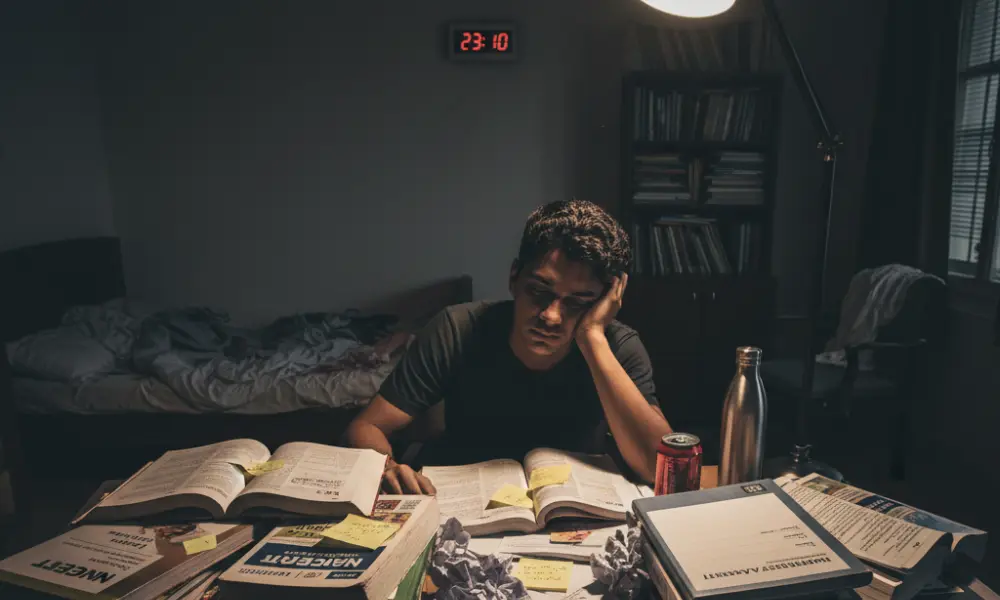Scientifically backed techniques to manage board exam stress for Class 10 and 12 students
Board exams can be overwhelming, but stress doesn't have to be. This guide offers proven strategies to help CBSE Class 10 and 12 students cope with anxiety and stay focused. Parents and teachers will also learn how to offer meaningful support throughout the exam journey.

The culmination of years of schooling in the CBSE system is marked by the board examinations that students take in class 10 and 12. These examinations assess academic achievement and the student’s ability to manage extreme stress. Often, the pressure begins mounting several months in advance of the exam, and in the absence of appropriate strategies, stress can manifest in unmanageable levels. While alertness and focus retention tend to sharpen with some stress, chronic stress is likely to cloud memory, diminish focus, and negatively impact physical and mental health.
For students, particularly those in the CBSE system, goal-oriented learning involves understanding the nature of stress, equipping oneself with tools to manage it, and adopting the right techniques to maintain overall well-being. To this end, we endeavor to explain, in this guide, the techniques that have proven most effective in managing exam anxiety from the perspective of pertinent research, within the pre and post board exam context.
For most Indian students, board examinations are the first instance of being assessed on a national level. It is of no surprise that students bear a lot of burden from parents, inter-student rivalry, and future academic goals. The CBSE board exams are often considered to be a ‘do or die’ situation which only increases the stress further.
This kind of stress triggers what is known as ‘fight or flight response.’ It is a biological response that happens when the body goes through physiological stress and releases hormones such as cortisol and adrenaline. While this response is helpful in small doses, it can be harmful if it is prolonged. Students are likely to face sleeplessness, stomach problems, increased irritability, racing thoughts, and impaired information retention. Being able to identify the signs early on allows students to intervene in a timely manner to implement soothing tactics to help calm the stress.
One of the most effective ways to reduce anxiety before an exam is developing a detailed study schedule. When students have set goals of what they need to study and when, they have a better chance of feeling in control of the situation. The first step is to have a look at the entire CBSE syllabus and break it down into smaller, more manageable parts. This provides a sense of progress and helps to avoid the overwhelming feeling that comes with intensive last-minute studying.
With a set deadline, students can mark down specific tasks on a wall calendar or a digital planner to visualize their preparation schedule. It is crucial to allocate time for the revision, mock exams, and reinforcement of core concepts. Implementing the Pomodoro Technique, which suggests studying in focused bursts of 25 minutes followed by short breaks, helps sharpen focus and avoid burnout. Moreover, students benefit from practicing previous years’ CBSE papers under timed conditions as it simulates exam pressure, revealing crucial improvement areas.
Active participation from peers through group study sessions is effective in enhancing motivation and understanding, as long as the group remains task-oriented. Actively clearing doubts and explaining concepts to one another often leads to a better understanding of the concept. The objective is to foster an environment where one can approach their studies calmly and confidently, as opposed to fear and panic.
Stress is not solely linked to study hours and includes a student’s behavior outside of course engagement. Mental wellbeing is enhanced significantly with improved stability of a daily routine. Committing to set sleep and wake times enhances mental acuity, increases the quality of sleep, and allows sharpening of mental processes. Proper nutrition, hydration, and limited screen time are also vital.
Even low-intensity physical activities such as brisk walks and basic yoga stretches help release natural mood and anxiety-enhancing chemicals in the brain, known as endorphins. Emotional brain resets can also be achieved through creative disconnection breaks, such as drawing or listening to music. Regular and short breaks for creative activities are important for mental resets.
Parents are key to the effective functioning of this model. Facilitating autonomy and responsible decision making, as opposed to using strict behavioral guidelines, promotes self-regulation. Allowing students to set their own pace within robust frameworks enhances self-efficacy and fosters long-term stress resiliency.
Mindfulness and breathwork are useful techniques that can be integrated into daily life to alleviate exam anxiety. They help to disengage the body from the stress response and shift it to a relaxed state by stimulating the parasympathetic nervous system.
The 4-7-8 breathing method is a perfect illustration. Recommended to be practiced by inhaling for 4 seconds, holding the breath for 7 seconds, and then exhaling for 8 seconds. With this method, breathing is done in a deliberate and controlled manner which reduces heart rate and calms the mind. This method can be used both prior to a study session and in the heat of the moment during the exam.
Other more advanced strategies include guided meditation, progressive muscle relaxation, or other visualization techniques which are useful in shaping one’s response to stress. This is done for example by picturing yourself serenely and assertively walking into the exam room, and effortlessly writing the paper, which can evoke calm and enhance performance. Writing as a form of journaling about worries or affirmations is another way to mitigate clutter, and enhance mental and emotional resilience.
A student's cognitive acumen and overall sharpness is linked with the physical health habits. Neglecting the latter is common during exam periods. Whereas staying up late, skipping meals, or a reliance on fast and sugary food becomes the new normal.
A well-nourished brain is better able to accomplish the mental tasks required. I recommend meals that contain a balance of whole grains, proteins, fresh fruits, and vegetables. For example, nuts, yogurt, and eggs, as well as leafy greens, boost both memory and attention. Proper hydration is just as important—water, in particular, helps to avert concentration and fatigue issues that arise with dehydration.
Fitness, in the form of mental exercises or physical activities, is an effective way to enhance one’s cognitive skills. Weightlifting and pushups power boost mental concentration and attention. Meditation enhances focus recall, and aids in the performance of complex problem-solving tasks.
I recommend that students take power naps. Ideally, one should ideally not exceed 30 minutes of sleep in the daytime. The objective is to refresh oneself. And this is best done in the shortest time possible.
When it comes to sleep, taking time intended for it, in order to revise, is counterproductive. Extensive periods of rest, for example long naps, should not be taken, as this disrupts the cycle of sleep. Research sleep helps one to remember information, enhances one’s problem-solving skills, and helps one to manage their emotions, all in an effective way.
In sum, sleep deprivation and not taking the time to rest is not the best approach when trying to revise, and is in fact counterproductive. Final preparation in fact should be done well in advance.Staying Grounded on Exam Day: How to Manage Anxiety on the Morning of the Exam
Most students witness a spike in stress during an exam, and finding ways to ease it could go a long way toward making the most of the chosen exam prep technique. The previous night, students must ensure that they have the exam documents, id card, and utensils that require pens, and pencils to avoid last minute panic.
Breakfast also plays an important role - students are advised to avoid brifeasts tha have an examull of heavy and oily foods to ensure alertment and agility during the exam, and reach the centre in time to get accustomed to the surrounding.
A the exam nerves begin to ease, students must go through the exam and allocate time, taking deep breaths and short pauses to re-focus. During the exam, slow breaths help in focusing the the task at hand. Remember slow deep breaths help everyone, and everybody gets worried but it is best to help and guide oneself in a calm and peaceful way.
Relief from an exam’s time pressure and stress does not always signal the end of mental strain. There is always the compulsion to check for errors, conduct self-assessment, and perform peer review. As is the case with other assessments, excessive self or peer review can lead to self-defeating thoughts, resulting in deleterious mental states, such as anxiety.
The thought process during and after an exam should be directed towards the next activity, be it leveling up for the next challenge or simply unwinding. Students should take breaks after intensive mental exertion to help sooth stress. Balancing work and play is vital to health. It is critical from both the students and parents perspectives to not fixate on exam results, as the journey is what matters.
The gap between the last exam and result release can also be a source of anxiety. In addition to reframing exposure during this phase, such as purposeful reading and volunteering, students should aim to fill their time with light, skill-based courses. In addition to self-assurance, this helps dissociate students from the misconception that exam results define their worth.
In today's world, not only does the education system need to change, but also the methods of examination used. While performance does matter, progress becomes even more essential. Each examination, whether a passing or failing experience, offers opportunities to learn important lessons, skills, or attributes such as discipline, determination, and emotional regulation.
It is crucial that parents, teachers, and mentors avoid using results and grades as the sole measuring yardstick of candidates’ performance. Parents, in particular, need to embrace and encourage emotional fortitude, show concern for the cared milestones, and celebrate constructively any observable change. Children need to be afforded the opportunity to attempt, learn, and even fail. The presence of such safe environments cultivates strong and healthy emotional growth, enhances a child’s self-efficacy, and encourages exploration of the world.
Forcing a child to sit and meditate prior to sitting for board examinations is not a guaranteed way to manage stress. Motivation, relaxation approaches, and simple relief techniques will not make a change. What is critical, is the nurturing of mediating stress techniques and lifelong practices that will help students not only in the immediate future, but also in all other spheres of life. Strategies to manage time, emotional awareness, self-love, as well as effective and healthy channels, to express feelings will make a tremendous difference.
At Edzy, we are aware of the impact exams have on one's mental health. This is precisely why our gamified learning modules extend beyond the academic scope. They aim at fostering routine learning through achievable goals, rewards, challenges, and other interactivity—shifting the perspective on preparation from a pressurized endeavor to a progressive journey. With AI-driven bespoke tailoring, students receive guidance tailored to them, which is a lot less overwhelming and enhances confidence over time.
The experience of exam stress is shared by a wide population. However, utilizing the proper mental approach and tools, individuals can effectively navigate through it. Students armed with a balanced study schedule, motivation, and tools to gamify their learning can take charge of their mental health and academic endeavors.
Parents and educators need to collaborate to foster a more balanced approach and refrained from judging students to help them feel better. Students provided with the opportunity to feel emotionally safe achieve a lot more, not just in exams, but in life. Rather than solely being viewed as a test of one’s memory, allow board exams to serve as a foundation to build confidence, growth, and resiliency.

How to Prepare for the New CBSE Competency-Based Question Format
Mastering the new CBSE exam format for better academic performance

CBSE Question Paper Analysis: Trends You Must Know for 2025 Exams
Unlocking the secrets of CBSE question papers for smarter exam preparation

Top 10 Mistakes Students Make During Board Exam Preparation
Learn how to avoid common pitfalls in board exam preparation

CBSE Science Practical Exams: The Complete Student Guide
Master your CBSE Science practical exams with confidence and skill.